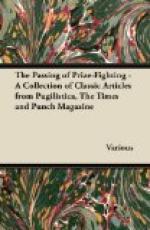The tenacity of life displayed by BULL is paralleled by a case quoted by LE VAILLANT. That naturalist speaks of a turtle that continued to live after its brain was taken from its skull, and the cavity stuffed with cotton. Is not England, with spinning-jenny PEEL at the head of its affairs, in this precise predicament? England may live; but inactive, torpid; unfitted for all healthful exertion,—deprived of its grandest functions—paralyzed in its noblest strength. We have a Tory Cabinet, but where is the brain of statesmanship?
Now, however, there are no Tories. Oh, no! Sir ROBERT PEEL is a Conservative—LYNDHURST is a Conservative—all are Conservative. Toryism has sloughed its old skin, and rejoices in a new coat of many colours; but the sting remains—the venom is the same; the reptile that would have struck to the heart the freedom of Europe, elaborates the self-same poison, is endowed with the same subtilty, the same grovelling, tortuous action. It still creeps upon its belly, and wriggles to its purpose. When adders shall become eels, then will we believe that Conservatives cannot be Tories.
When folks change their names—unless by the gracious permission of the Gazette—they rarely do so to avoid the fame of brilliant deeds. It is not the act of an over-sensitive modesty that induces Peter Wiggins to dub himself John Smith. Be certain of it, Peter has not saved half a boarding-school from the tremendous fire that entirely destroyed “Ringworm House”—Peter has not dived into the Thames, and rescued some respectable attorney from a death hitherto deemed by his friends impossible to him. It is from no such heroism that Peter Wiggins is compelled to take refuge in John Smith from the oppressive admiration of the world about him. Certainly not. Depend upon it, Peter has been signalised in the Hue and Cry, as one endowed with a love for the silver spoons of other men—as an individual who, abusing the hospitality of his lodgings, has conveyed away and sold the best goose feathers of his landlady. What then, with his name ripe enough to drop from the tree of life, remains to Wiggins, but to subside into Smith? What hope was there for the well-known swindler, the posted pickpocket, the callous-hearted, slug-brained Tory? None: he was hooted, pelted at; all men stopped the nose at his approach. He was voted a nuisance, and turned forth into the




